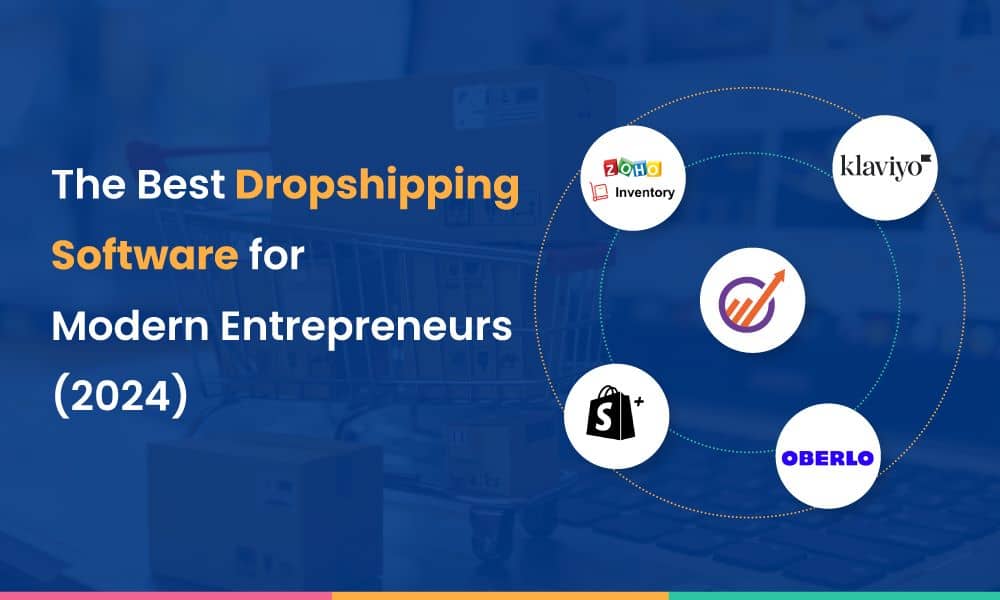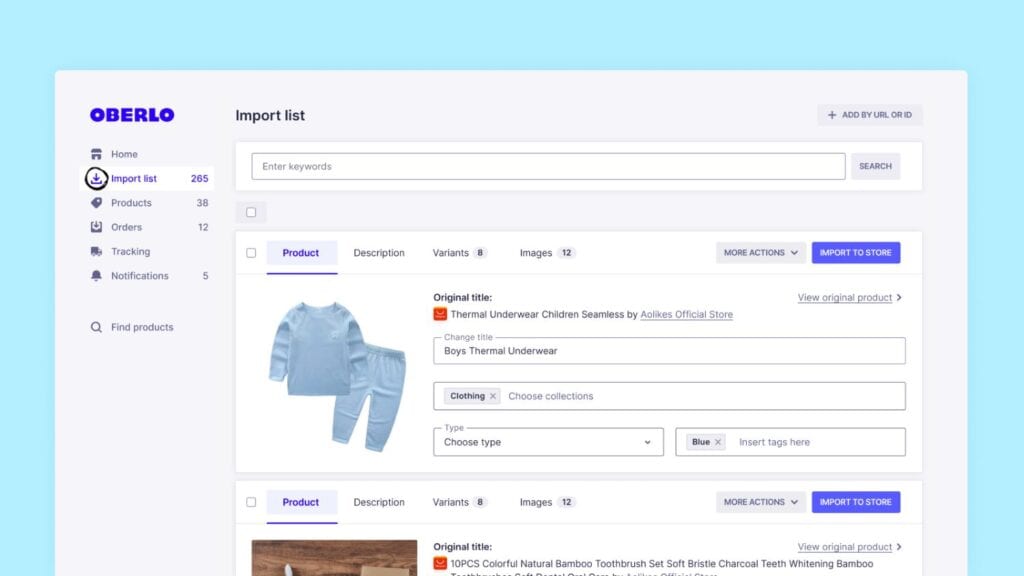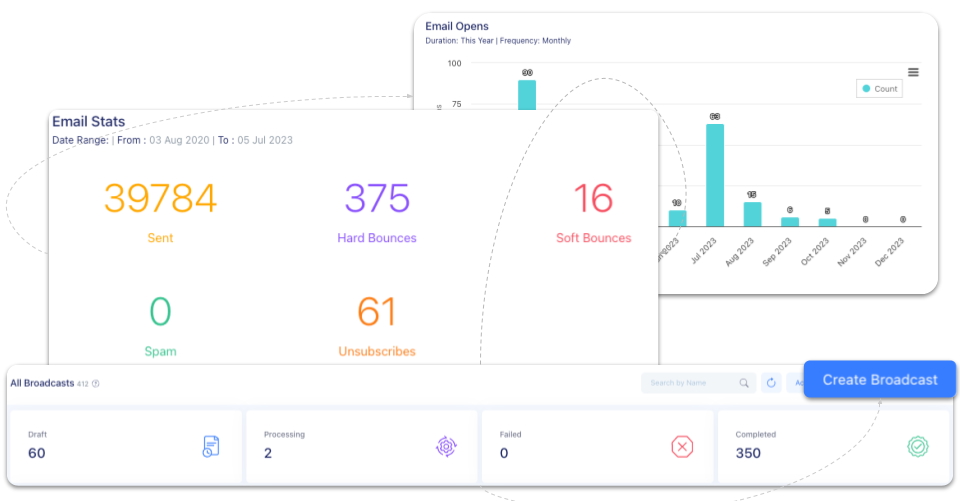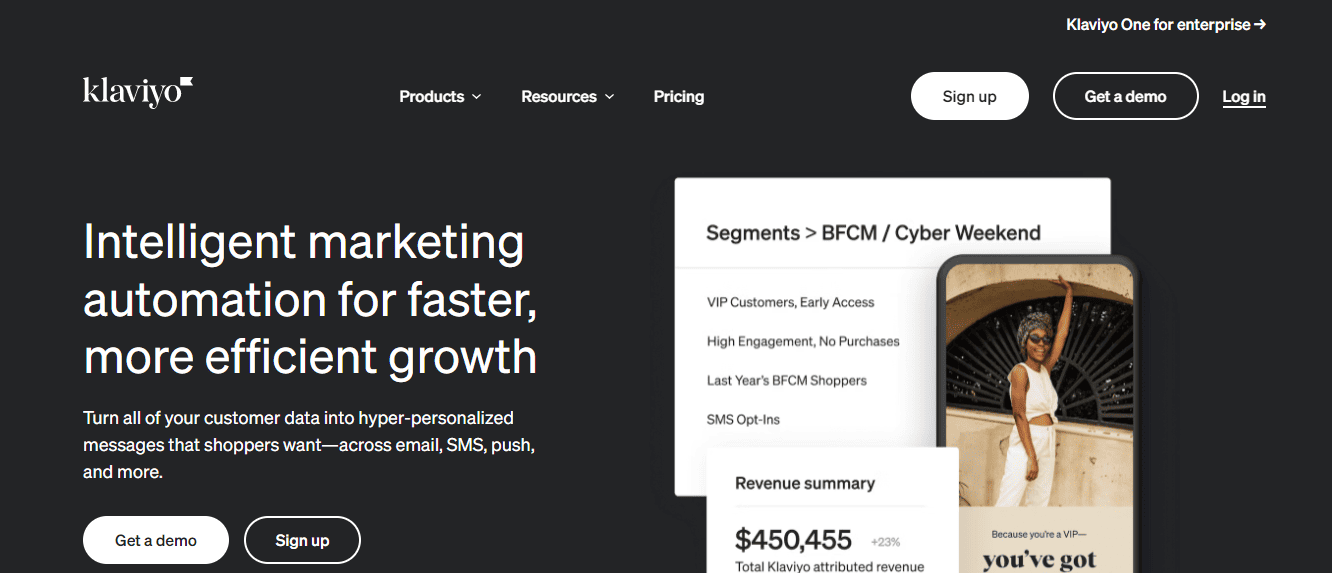In the ever-evolving world of eCommerce, dropshipping has emerged as a game-changer, offering modern entrepreneurs the chance to diversify their income streams or build thriving online stores without the heavy lifting of inventory management.
However, while the dropshipping model opens doors to vast opportunities, it also presents unique challenges.
To capitalize on the benefits of dropshipping, you need the right tools in your arsenal.
The right dropshipping software tools can be the difference between a chaotic workflow and a streamlined, efficient business operation. From automating tedious tasks like order processing and inventory management to enhancing customer service and tracking orders, these tools are essential for driving success in your dropshipping venture.
But with so many options available, where do you start?
In this blog post, we’ll look at the best dropshipping software tools for various needs, including inventory management, marketing automation, CRM, and more.
Let’s dive in.
Table of Contents
Types of Dropshipping Software for eCommerce Business
Running a dropshipping business demands continuous assessment of emerging technologies and how they can benefit your operations.
To streamline your processes effectively, you need to focus on tools that offer a robust assortment of automation features and can seamlessly integrate with the various players involved in your dropshipping setup.
Incorporating the right dropshipping software tools into your business can significantly enhance your operations.
By automating time-consuming tasks like order processing, inventory management, order tracking, and customer service through chatbots, you can free up valuable time to focus on scaling your business.
However, the key to success lies in understanding which tools are suited for specific functions, ensuring that each aspect of your dropshipping operation runs smoothly and efficiently. Let’s see what these types are.
Inventory management software
Effective inventory management is crucial for the success of any dropshipping business, especially when leveraging dropshipping automation software.
This software category provides comprehensive solutions for real-time inventory tracking, allowing you to monitor suppliers’ stock levels and avoid potential pitfalls, such as overselling or running out of stock.
When selecting inventory management software, prioritize features like real-time tracking capabilities to ensure you can instantly check product availability and maintain a smooth sales process. Strong supplier management features are equally important, enabling you to oversee multiple suppliers efficiently, manage stock quantities, and account for lead times.
Automated order processing capabilities are another key consideration. These features streamline the entire order lifecycle—from receiving to processing and tracking—resulting in increased accuracy and productivity.
With the right dropshipping automation software, managing the intricate interactions between your sales channels and suppliers becomes seamless, ensuring that your inventory and supplier relationships are well-maintained and optimized for success.
Order fulfillment and processing tools
Accurate automation of order processing is essential for efficiently meeting customer demands in the fast-paced world of dropshipping. This software category includes tools designed to streamline the entire order processing cycle, from order placement to coordination with logistics.
When evaluating dropshipping tools in this category, look for parameters like real-time order tracking and fulfillment capabilities, which provide instant updates on customer shipments.
This ensures that orders are processed swiftly and accurately, enhancing customer satisfaction.
The ability to integrate across multiple sales channels is another critical feature to consider. As businesses expand, they must efficiently manage orders from various platforms, ensuring a seamless experience for both the seller and the buyer.
Integration with shipping carriers is also a valuable feature, as it allows for the easy evaluation of shipping rates, the generation of shipping labels, and the handling of returns.
This comprehensive approach to order processing automation can significantly reduce the manual effort involved and improve the overall efficiency of your dropshipping business.
Customer relationship management (CRM) software
CRM is a cornerstone of managing customer relationships, crucial for maintaining and nurturing the connection between a business and its clientele. A robust CRM system allows businesses to store and manage vital customer information, including names, addresses, purchase histories, and preferred communication methods.
When evaluating CRM solutions, looking for features that facilitate automated communication, such as sending emails, SMS, or notifications directly from the system, is essential. This ensures timely and personalized interactions, enhancing customer engagement and satisfaction.
Additionally, powerful customer segmentation capabilities are invaluable. These features enable businesses to target specific customer segments with tailored promotions and marketing efforts, increasing the effectiveness of campaigns and fostering stronger customer loyalty.
Analytical and reporting tools
Business intelligence is crucial for identifying strengths and weaknesses in dropshipping operations and empowering entrepreneurs to make informed decisions. Effective analysis and reporting tools are essential for analyzing sales, customer behavior, and financial data, providing the insights needed for strategic decision-making.
When selecting business intelligence tools, look for features that offer robust reporting capabilities, comprehensive metrics tracking, and advanced forecasting analysis. These tools should seamlessly integrate with other essential business systems, such as CRM and inventory management, to provide a holistic view of operations.
With these tools, you can effectively plan for the future, identify growth opportunities, and address potential challenges, ensuring the long-term success of your dropshipping business.
Security and compliance software
Security is critical for dropshipping businesses, particularly when handling online transactions and sensitive customer data.
Compliance and security software are vital in safeguarding your business from threats and ensuring adherence to eCommerce regulations.
When selecting security tools, prioritize those that offer robust encryption, secure payment gateways, and comprehensive compliance monitoring. These tools should also address vulnerabilities like fraudulent orders and data breaches, which are increasingly significant risks in the dropshipping industry.
Ensure that the chosen security software is compatible with your payment gateways and online shopping carts, providing consistent and standardized security measures across all transactions. This approach protects your business and builds customer trust, enhancing your brand’s reputation.
Read also: 6 Dropshipping Email Marketing Best Practices (2024)
4 Top Inventory Management Software
Understanding the importance of dropshipping automation software is essential for real-time inventory tracking and updating, which helps prevent stock issues and enables seamless coordination with multiple suppliers.
Effective inventory control is intertwined with finding and managing relationships with dropship suppliers, and leveraging inventory management software can significantly streamline these processes.
A robust dropshipping tool offers significant benefits for established and emerging businesses, allowing them to track inventory accurately, prevent overselling, and optimize order fulfillment.
By integrating this tool with other essential automation and integration options, businesses can gain a comprehensive view of available stock across various suppliers, enabling quick restocking and reducing fulfillment delays.
Additionally, these platforms enhance supplier relationships by providing features like automated reordering, pricing adjustments, and stock management, ultimately improving the overall dropshipping experience and ensuring smooth operations.
1. Zoho Inventory
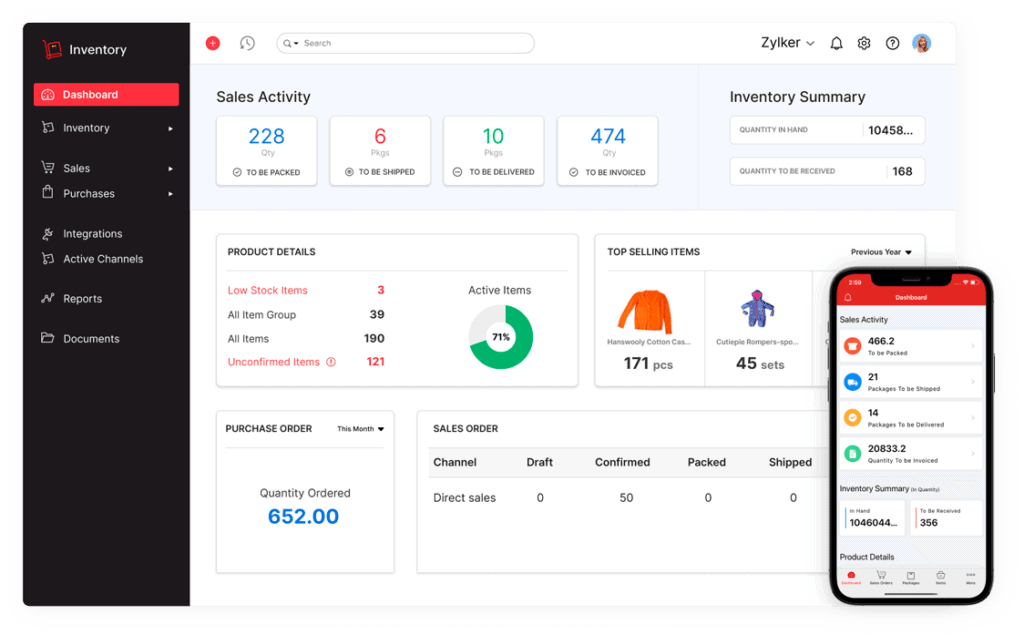
Zoho Inventory provides the best solution for handling inventory and its complete management for business organizations.
It offers capabilities and facilities like order tracking tools, order management, and multi-channel selling services.
With the help of Zoho Inventory, users can automate the processes and manage the data.
Moreover, you can get more detailed information about inventory at any moment with the help of reports and analysis.
Unique features:
- Multi-channel selling integration
- Batch and expiry tracking
- Integrated shipping solutions
- Robust reporting and analytics
Pricing: Free; $29 to $249/month (billed for a year)
2. Fishbowl
Fishbowl is an inventory management application and a dropshipping solution developed for small and medium-sized businesses.
Its services include stock management, order management, and storage services. This dropshipping software is also compatible with QuickBooks and other accounting solutions.
This makes Fishbowl an all-inclusive tool for inventory and operational management.
Unique features:
- Advanced warehouse management
- Seamless QuickBooks integration
- Customizable user permissions
- Automated reorder points
Pricing: Contact them for a quote
3. Cin7
Cin7 is a reliable inventory management application that focuses on the needs of retail and wholesale businesses.
It offers order management, stock control, and channel selling features. Other features of Cin7 include demand forecasting, manufacturing planning, and integration with third-party logistics.
This makes Cin7 a very effective system for managing complex inventory.
Unique features:
- Demand forecasting tools
- Multi-location inventory management
- Third-party logistics integration
- Built-in POS capabilities
Pricing: Starts at $349/month
4. Katana
The state-of-the-art manufacturing and inventory management tool Katana is tailored toward producers and merchants operating small and medium-sized businesses.
Some useful components are production planning and control, order processing, and real-time stock monitoring. Additionally, Katana works well with the most used shopping carts, such as Shopify and WooCommerce.
This capability enables a business to track its stock and processes in one software.
Unique features:
- Visual production scheduling
- Raw material tracking
- Dynamic inventory management
- Sales order automation
Pricing: $179 to $1,799/month (billed annually)
Lesser-known alternatives
- Ordoro: Ordoro is a powerful Order & Inventory Management software that automates the flow of eCommerce businesses.
- Inflow: Inflow is a versatile inventory system designed exclusively for small and medium-sized businesses. It enables the tracking of inventories and the management of suppliers and helps manage and organize the workflow for processing orders.
- Extensiv: Extensiv is an inventory management software available through the cloud that helps businesses track inventories and orders.
Read also: How to Build a Dropshipping Brand That Clicks
4 Best Order Fulfillment and Processing Tools
Now that you understand the best dropshipping software for inventory management, let’s move on to order fulfillment.
This next step involves exploring the processing tools that are essential for managing and automating operations in your dropshipping stores.
These tools are crucial not only for automating and enhancing order fulfillment but also for the overall efficiency of your business. They streamline the daily operations of platforms like eBay and other dropshipping networks, ensuring smooth and effective management.
Specifically, these tools are designed to efficiently handle and enhance product images, create professional videos, identify popular products, and set the right prices to maximize profits.
Incorporating these tools into your workflow can significantly improve your dropshipping business’s operational efficiency and profitability.
1. Oberlo
Oberlo is one of the most used dropshipping tools and works well with Shopify.
It helps buyers search for products they need and add them to their online store. Moreover, you can search for products on AliExpress and other companies and manage orders and delivery.
Unique features:
- Wide selection of products from AliExpress
- Automated order processing and fulfillment
- Product customization and pricing management
- Order tracking and shipment monitoring
Pricing:
- Free trial available
- Premium: $29.90/month
2. Spocket
Spocket is a dropshipping platform that offers suppliers from all over the globe for merchants.
It provides quality products for online stores. The customers can also get the products with quick delivery times and professional invoices, thus improving the customer experience.
Unique features:
- A selection of high-quality goods with fast shipping
- Branded invoicing and packaging options
- Real-time inventory and order tracking
- Dedicated customer support and wholesale pricing
Pricing:
- 3-day free trial
- Starter account: $24.99/month
- Pro account: $49.99/month
- Empire account: $99.99/month
3. Dsers
Dsers is an order management and automation system that is targeted at dropshippers.
It enables users to quickly pack and ship several orders, control suppliers, and track delivery from AliExpress.
Unique features:
- Bulk order processing and automation
- Supplier management and product sourcing
- Order tracking and shipment status updates
- Integration with AliExpress for seamless order fulfillment
Pricing:
- 14-day free trial
- Advanced Plan: $19.90/month
4. AutoDS
AutoDS is an all-in-one tool that optimizes different aspects of the dropshipping business, such as product acquisition, order management, and pricing.
Unique features:
- Product sourcing from multiple suppliers and marketplaces
- Automated order processing and fulfillment
- Price and inventory monitoring with automatic adjustments
- Integration with eBay, Shopify, and other platforms for seamless operations
Pricing:
- The free trial starts at just $1
- Paid plans start at $19.90/month (Billed annually)
Read also: The Hidden Dangers of Overstocking
How Order Fulfillment Tools Streamline Orders
Order fulfillment and processing tools are essential for efficiently managing orders in a dropshipping business. These tools cover every step of the order fulfillment process, from capturing orders to shipping and tracking them.
Additionally, they help ensure that the flow of dropshipping products aligns with the business operations standards in online stores. By leveraging state-of-the-art technologies and integration options, these tools guarantee quick and accurate execution of activities, ultimately enhancing the efficiency and reliability of your dropshipping operations.
Automated order entry
Order fulfillment tools streamline the capture and processing of customer orders by automatically entering information into your system.
Fully integrated with eCommerce platforms and marketplaces, these tools capture orders in real time, minimizing the risk of human error and significantly reducing processing time.
This automation ensures that orders are quickly received and ready for processing, leading to faster and more accurate fulfillment.
Order tracking
All these tools share the feature of offering real-time order tracking to merchants and clients.
In partnership with shipping carriers and logistics providers, merchants can track the progress of orders from when they are processed until they are delivered.
They can also check their order status, increasing their confidence in the purchases made.
Logistics coordination
All these tools offer real-time order tracking, benefiting both merchants and clients. By partnering with shipping carriers and logistics providers, merchants can monitor the progress of orders from processing to delivery.
This capability also allows customers to check the status of their orders, enhancing their confidence and trust in their purchases.
Read also: Dropshipping vs Wholesale: What’s Better for You?
5 Customer Relationship Management (CRM) Software
The customer is the cornerstone of any successful business, making efficient customer relationship management vital. This is where Customer Relationship Management (CRM) software becomes indispensable.
CRM software enables businesses to consolidate customer information, track communication history, and personalize interactions, enhancing customer satisfaction—especially in eCommerce and dropshipping.
By providing a comprehensive view of the business and its customers, CRM solutions help anticipate customer needs and respond effectively, fostering stronger, lasting relationships.
For eCommerce retailers, CRM software ensures every customer interaction is seamless and optimized, supporting business growth from startups to large-scale enterprises. This management level is crucial for maintaining customer loyalty and driving long-term success.
Here are five CRM software options suitable for dropshipping businesses:
1. EngageBay
EngageBay is an all-in-one marketing, sales, and CRM platform designed to simplify customer management, automate communication, and track sales pipelines efficiently.
EngageBay offers an intuitive interface with rich features tailored to small and medium-sized businesses. It also integrates seamlessly with various eCommerce tools, making it a versatile option for dropshipping businesses.
Unique features:
- Intuitive and user-friendly interface
- Integrated marketing automation
- Comprehensive customer support tools
- Affordable pricing plans for growing businesses
Pricing: Starting at $11.04/month
2. HubSpot CRM
HubSpot CRM makes customer management, communication automation, and sales pipeline tracking easier.
Its offering is comprehensive, including a user-friendly interface and helpful features. It has one of the most customization options and can be easily integrated into many popular eCommerce automation solutions.
Unique features:
- User-friendly interface
- Free version available
- Email tracking and automation
- Seamless integration with marketing tools
Pricing: Starting at $20/month
3. Salesforce CRM
Salesforce CRM is a versatile solution that helps firms of all types and sizes and offers various features for customer management, sales, and marketing.
Since dropshipping is a business module that grows with the demands, it is ideal for growing businesses, thanks to its flexibility and scalability.
Unique features:
- Highly customizable
- Extensive third-party integrations
- Advanced reporting and analytics
- Scalable for large enterprises
Pricing: Starts at $80/user/month
4. Zoho CRM
Zoho CRM is a set of tools that helps companies build and maintain customer relationships.
This process starts with attracting potential customers and continues until it is necessary to provide services after the sale. Features like lead scoring, email automation, and sales forecasting can help dropshippers make their sales and marketing processes much more efficient.
Unique features:
- A suite of business applications
- Workflow automation capabilities
- Role-based security settings
- Integration with productivity tools
Pricing: $57/user/month
5. Pipedrive
Pipedrive is an application that focuses specifically on sales. It can be used as a Customer Relationship Management tool to manage sales funnels.
Pipedrive facilitates lead management, deal tracking, and sales reporting, making the social platform widely preferred for use by dropshipping entrepreneurs.
Unique features:
- Sales pipeline management
- Visual drag-and-drop interface
- Goal-setting and tracking features
- Mobile app for on-the-go access
Pricing: Starts at $14/month/user
Of course, there are the already mentioned CRM options, but other non-mentioned options exist for dropshipping businesses. One of the tools available is Insightly.
This program provides easy navigational access to the CRM and comprehensive project management tools. Another one is Freshworks CRM, which offers flexible processes and automates some processes thanks to AI technology.
For businesses looking for an affordable solution with powerful features, Capsule CRM can be a good choice for updating contact information and overseeing sales workflows.
Agile CRM is particularly notable because the company’s attempt to provide the full array of sales, marketing, and service features within a single, integrated platform is noteworthy.
Lastly, Nutshell CRM offers significant usability and integration options for various organizations, making it widely used by organizations of every size.
Regardless of the solution chosen, the successful advancement of the client-oriented management system is crucial for developing dropshipping organizations and customer loyalty.
Read also: Dropshipping Cash Flow Management 101 for Dropshippers
Dropshipping Marketing Automation Software
Marketing automation tools provide significant benefits regarding reaching out and conversion enhancements within the dropshipping industry.
These tools get in touch with the audience and assist organizations in selling their products through some of the many automated marketing tasks and repetitious workflows.
When choosing the right marketing automation software for dropshipping, a few big aspects tied to eCommerce businesses must be considered.
Features to look for:
- Abandoned cart recovery: Prompt customers who abandon shopping carts with an automated email completion notice.
- Product suggestion: To finalize the strategies that can help to maximize the chances of cross-selling and upselling, you need to incorporate algorithm-based recommendations of products that might interest a customer, given their previous browsing and purchasing behavior.
- Email personalization: Provide customized communications according to the customers’ interest and their previous actions taken, offering a unique experience with individualized emails.
- Dynamic content: Personalize website content and email communications about products and services based on consumer characteristics and behaviors to increase interest and conversion rates.
1. Klaviyo
Klaviyo is relatively active in email marketing and automation, which has been specially developed for eCommerce companies.
It integrates well with platforms such as Shopify and WooCommerce. So, the platform assists organizations in effectively reclaiming their customer data and employing it to launch customer-focused marketing strategies.
Due to its advanced categorization and automated features, it allows businesses to communicate positive, relevant messages effectively. These messages are curated to directly correspond to a customer’s behavior, previous purchases, and preferences.
Klaviyo also comes equipped with superior analytic features to show the effectiveness of campaigns and clients’ interactions to enhance marketing techniques and boost sales outcomes.
2. Mailchimp
Mailchimp justifies its popularity by offering a comprehensive suite of marketing automation tools.
It allows businesses to automate email marketing and social media advertising as it integrates with platforms such as Shopify, Magento, and BigCommerce.
The intuitive interface and the multiple templates it provides for creating campaigns enable users to create more personalized campaigns. More elaborate functions like target audience selection and split testing of the actual campaigns advance the service’s capabilities.
In addition, Mailchimp offers powerful metrics and evaluating tools that let a business understand the effectiveness of a campaign and make the right decisions to improve its performance.
3. ActiveCampaign
ActiveCampaign has flexible automation features, which enable it to be favored especially by eCommerce clients who wish to engage their customers throughout the buyer’s journey.
Compatible with the most popular Shopping Carts, ActiveCampaign allows tailoring communication with customers and prospects according to their actions and interests.
These include lead nurturing, abandoned cart recovery, and follow-ups aimed at engaging leads and converting them into buying customers.
ActiveCampaign also has more advanced targeting and multiple list-splitting features. As well as extensive statistics and reports to analyze campaign and marketing strategy performance.
4. Drip
Drip is celebrated as a marketing automation tool and a tool specifically built for eCommerce.
The advanced version incorporates features such as behavior-based automation, product recommendations, and multi-channel marketing.
Drip easily connects with the top eCommerce platforms such as Shopify, WooCommerce, and Magento. It enables the establishment of complex automation processes and touchpoint engagement with clients at the various stages of their client journey.
Dropshippers can deliver auto emails and send messages to clients with Drip based on their actions, and they can predict and measure the increase in sales among drop shippers.
Read also: How to Master Dropshipping Data Analytics for Success
Analytical and Reporting Tools
Among the most effective components for dealing with dropshipping businesses are the analytical and reporting tools used to track and enhance the performance of outlets.
Using these applications, business people can analyze diverse facets of the company.
Including sales levels, customers’ behavior, and financial health, among others, to help entrepreneurs make the adequate decisions necessary to achieve the best results.
Role of analytics
Metrics are used to analyze the performance of a dropshipping business since analytics are crucial for tracking various aspects of the business.
These metrics are very important since they reveal trends and patterns that can be used to help refine approaches in sales and marketing, such as conversion rate, sales revenue, and costs of acquiring customers.
With the help of performance measurement, over time, the marketing communication plans, product and service portfolios, and organizational procedures can be evaluated for successful implementation and produce actionable insights for growth and value creation.
Software solutions for detailed reporting
There are numerous software options to obtain detailed reports on aspects of a dropshipping enterprise.
Tools like Google Analytics, for instance, come with a myriad of reporting features that enable enterprises to monitor the volumes of traffic to and engagement of users on their sites and their conversion rates.
Along with Shopify and WooCommerce, they offer inherent reporting tools that enable users to check significant sales, customers, and inventory data.
Similarly, there are more complicated reporting tools designed specifically for eCommerce, like Metrilo and Glew, that produce more specific insights about customer lifetime value, products, and marketing.
Read also: Top 10 Dropshipping Business Ideas to Make a Fortune
Tips for effective data utilization
To leverage data effectively for strategic decision-making, dropshipping businesses should follow these tips:
- Set clear objectives: Set measurable targets where the metrics align with the business’s objectives. Outcomes must have clear goals and relevant KPIs.
- Collect relevant data: Data sources can be located in Internet resources or a specific company’s sales reports, which further utilize customers’ feedback to define the company’s overall performance.
- Analyze trends and patterns: These can identify trends, patterns, and relationships between your data to help you discover solutions to problems.
- Test and iterate: It is recommended that cases be run and hypotheses and many strategies and tactics based on certain data and facts are checked.
- Stay informed: Stay abreast of new developments in the business world, particularly in data analytics, to enhance your analytical skills and reduce your competitive advantage gap.
Thus, analytical and reporting tools have a significant function in controlling and enhancing the efficiency of dropshipping companies.
These tools are helpful for a dropshipping store because they highlight sales, customers, and financial statistics. They can help them make worthwhile decisions, enhance their performances, and create enduring success.
Security and Compliance Software
Protecting financial and personal details in online transactions and data management is paramount in dropshipping businesses.
With the rise of cyber threats and data breaches, safeguarding customer information and complying with data security laws and eCommerce policies are essential to maintaining the trust and security of both the company and its customers.
Implementing robust security measures and adhering to regulatory requirements helps protect sensitive data, prevent unauthorized access, and ensure your dropshipping business’s smooth and secure operation.
Importance of security
Security is crucial when conducting business through a website and managing customers’ data.
Companies targeted by cybercriminals often hold sensitive client information, such as names, addresses, phone numbers, and payment details.
Implementing effective security measures mitigates these risks and fosters customer confidence and trust, leading to increased loyalty and satisfaction. Prioritizing security is essential for protecting both your business and your customers.
Recommended tools for compliance
The following are some tools that can be used to ensure compliance with data protection laws and other regulations affecting eCommerce platforms.
Shopify Plus
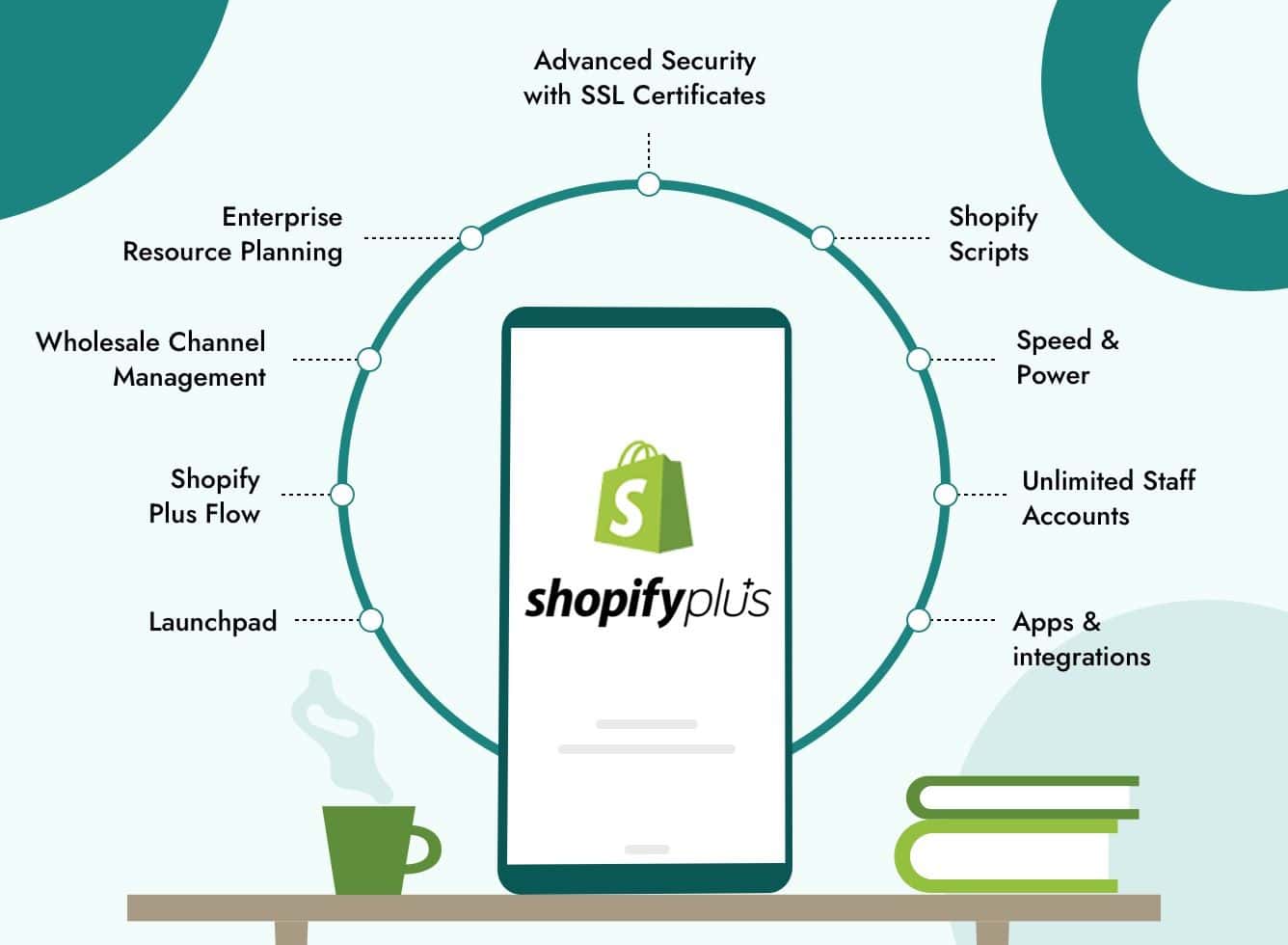
Shopify Plus has top-of-the-line security measures and compliance, such as PCI DSS compliance, for safe transactions and data protection.
Unique features:
- The latest security measures and SSAE 16 Type II and PCI DSS certificates.
- Has features that are useful for businesses that handle large amounts of transactions.
Privacy Shield
The EU–US Privacy Shield guides firms to legalize the transfer of personal data from the GDPR-compliant EU to the US, thereby assisting them in meeting the regulation’s requirements.
Unique features:
- Certification process of data information transfer between the EU and the United States.
- Helps to avoid violations of the General Data Protection Regulation in their business.
GDPR compliant apps
Shopify apps like GDPR Cookie Consent and GDPR Data Request Form facilitate compliance with GDPR requirements, including cookie consent management and handling data subject requests.
Lesser-known security challenges
Security issues are also complex, with many not being evident to dropshipping businesses. These challenges include:
Supplier vulnerabilities: Business partners are likely to have weak security measures and thus can be easy targets for hackers. Specific to this model, dropship suppliers should be chosen carefully, and the DD should put in place a suitable means of communicating with them to avoid vishing.
Data integration risks: Integrating various software and systems makes it easier to analyze the downsides, such as cyber-attacks and data breaches. Data security measures, including encrypting and authenticating data, help to protect the data during processing.
Third-party service risks: Outsourcing some functions, such as order delivery and customer service, is risky because it opens up the company to hacking. Moreover, for Third-party retaining personal information, dropshippers should evaluate the third-party vendor’s security procedures, with provisions sufficient to protect data confidentiality and integrity annexed to the contract.
Conclusion
The right tools are essential in choosing the best dropshipping software for a thriving business. As your company expands, continuously assessing and updating the software you use will keep your operations efficient and competitive.
Ultimately, leveraging technology is crucial to scaling and increasing profitability in dropshipping.
Remember, the right dropshipping software empowers businesses to drive efficiency, streamline processes, and adapt to market demands. Stay vigilant, innovate, and always harness the power of technology to elevate your dropshipping business to new heights.
EngageBay is an all-in-one marketing, sales, and customer support software for small businesses, startups, and solopreneurs. You get email marketing, marketing automation, landing page and email templates, segmentation and personalization, sales pipelines, live chat, and more.
Sign up for free with EngageBay or book a demo with our experts.
Frequently Asked Questions (FAQ)
1. What are the essential software tools every dropshipper should use?
Major tools for dropshippers include inventory management, order processing, customer relationship management (CRM), and marketing automation tools. By automating processes, improving processes, and bettering the customer experience, these tools assist in the smooth running of a company.
2. How much should I budget for dropshipping software?
The cost of the software for dropshipping depends on the type of business and the extent to which it will be implemented. At a basic level, a monthly subscription will cost between $20 and $50, while the professional plans may cost at least $100 per month.
3. What signs do I need to upgrade my dropshipping software?
Several signs indicate that the software needs to be upgraded. They include minimal functionality, scalability problems, and poor features affecting business expansion. Check the software’s efficiency frequently and opt for the new release if you want your work done faster.
4. Can I use free software tools for my dropshipping business?
Open-source applications can be more suitable for business processes in small companies as they are accessible and easier to use for corresponding tasks. However, they often do not contain some of the most significant functions or do not include any support. It must be noted that as your business expands, investing in paid versions of the software might be beneficial, depending on the number of features and users.
5. How do software tools integrate with popular dropshipping platforms like Shopify or WooCommerce?
Extensions can be found in application programming interfaces (APIs) or plugins embedded in reliable platforms such as Shopify or WooCommerce. Integration helps data transfer between platforms without breaking a formation, making it easier for businesses to work most efficiently.
